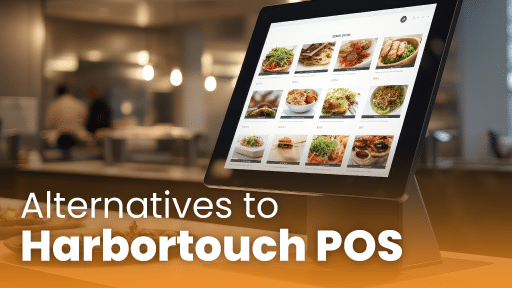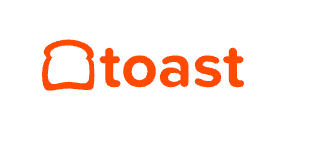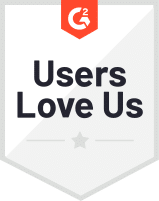Harbortouch POS is a restaurant-specific solution tailored to full-service restaurants, quick-service restaurants, and bars and nightclubs. While the software is user-friendly with low upfront costs, many users have complained about Harbortouch POS’s customer service, failure to issue refunds, and system failures.
If you’re a disgruntled Harbortouch POS user seeking an alternative, look no further! In this blog post, we will walk you through the 5 best Harbortouch POS alternatives so you can streamline your restaurant’s success.
Best Harbortouch POS Alternatives: A Quick Comparison
Product
Best For
Price
Processing Fees
Key Features
Best for:
Quick-Service Restaurants
Price:
From $59/month
Processing Fees:
No
Key Feature:
Payment processing agnostic and comprehensive customer support
Best for:
Mobile Food and Beverage Businesses
Price:
From $0/month
Processing Fees:
Yes
Key Feature:
Has the basics, easy to use and set up
Best for:
Full-Service Restaurants
Price:
From $0/month
Processing Fees:
Yes
Key Feature:
Restaurant-specific, built-in inventory management
Best for:
All-in-One Restaurant Management
Price:
From $69/month
Processing Fees:
Yes
Key Feature:
Comprehensive features for front and back of house
Best for:
Bars and Breweries
Price:
From $59/month
Processing Fees:
Yes
Key Feature:
Brewery-specific features like timed menu changes
KORONA POS: Best Harbortouch Alternative for Quick-Service Restaurants
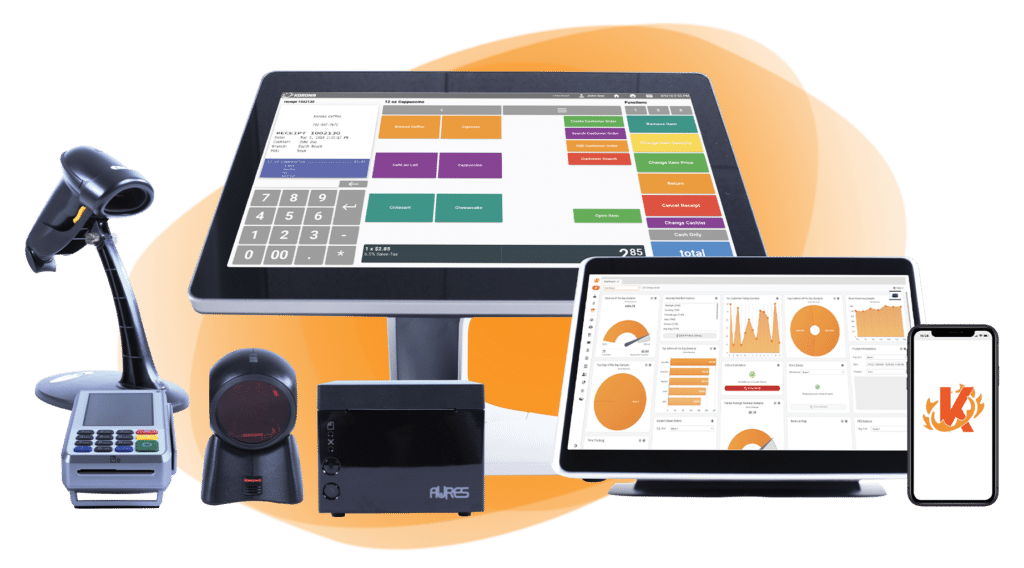
KORONA POS overview
KORONA POS is the top alternative to Harbortouch POS, especially if you own a quick-service restaurant where real-time inventory analytics and restaurant-specific integrations are essential.
KORONA POS is celebrated for its omni-channel experience—no matter what type of food operation you’re running, you can integrate with one of KORONA’s trusted partners to streamline operations.

Pros
- Advanced customer support
- Table management features
- Reporting and analytics
- Choose your credit card processor
Cons
- Learning curve
- Not restaurant-specific
Pricing
Core
$59/mo
- Various reporting
- Unlimited users
- Customizable dashboard
Freedom
$69/mo
- Stock management
- Barcode automation
- Price and shelf labels
Adds-on
From $10 to $50/mo
- KORONA integration
- KORONA Plus
- KORONA Invoicing
KORONA POS Key Features
- Inventory management tools: KORONA POS shines in its inventory management features. The software offers robust tools for handling SKUs, categories, brands, and promotions. You can also use KORONA to automate reorder levels and count and track shipments in real-time.
- Streamlined checkout and payment experience: KORONA POS offers up-to-date features to make your quick-service restaurant checkout experience seamless. Options include self-checkout, contactless payments, and EMV chip payments.
- Customer loyalty programs and promotions: KORONA POS features loyalty programs and customer relationship management (CRM) solutions to keep your customers returning for more.
- Comprehensive reporting and analytics: Clients can leverage KORONA POS to create year-over-year reports, understand product return rates, analyze foot traffic, and much more.
- 24/7 customer support: Customers frequently speak to KORONA’s exceptional customer service. When you’re running a restaurant, you need to be able to reach us in real-time. A subscription to KORONA POS always includes 24/7 customer support, installation assistance, and a training demo.
- Third-Party integrations: KORONA POS offers a well-integrated omnichannel experience, so you can manage your quick-service restaurant in one place. The system integrates with all modern payment options, protecting your business from fraud and chargebacks.
KORONA POS Pricing
KORONA POS’s pricing offers a tiered pricing structure with a flat monthly fee per terminal, with no contracts and no hidden charges. Here’s a breakdown:
KORONA POS Subscriptions:
- KORONA Core: KORONA Core starts at $59 per month per terminal. It provides basic POS functionalities like processing sales, managing inventory, and customer receipts.
- KORONA Retail: Priced at $69 per month per terminal, KORONA Retail builds on Core features with tools like employee management, loyalty programs, and reporting. It includes everything in Advanced, plus features like gift cards, age verification, and advanced inventory controls.
Optional Add-on Modules:
KORONA offers industry-specific modules that add functionalities on top of the base plans. These modules typically range from $10 to $50 per month per terminal. Here are some examples:
- KORONA Food: Ideal for restaurants and cafes, this module adds table service features for an extra $10 per month per terminal.
- KORONA Invoicing: Enables sending invoices for $10 extra per month per terminal.
- KORONA Ticketing: This module is suited for amusement parks and similar businesses, priced at $50 per gate per month. It allows managing admissions, memberships, and online ticketing.
- KORONA Franchise: For managing franchises, this module costs $30 extra per franchise location per month.
- KORONA Integration: This allows integrating KORONA with other business applications for an additional $45 per token per month.
Additional Pricing Details:
- KORONA POS offers a free trial to try out the software before committing.
- Hardware must be purchased seperately and depend on your chosen devices (tablets, desktops, etc.)
Notably, KORONA POS is processing-agnostic, meaning the POS can integrate with any major payment processing solution.
KORONA POS Reviews
KORONA POS is very highly rated on G2. Users love the customizable interface, the all-in-one system capability, and the exceptional customer service. Some users wish the software had an easier learning curve, and argue the software’s more complex features can be difficult to use and understand.
The “all-in-one” system capabilities such as ticketing, retail, food/beverage, online sales, and more. Having one POS that can be sufficient in multiple different areas is extremely beneficial for both reporting and operational purposes.
– Emily W.
Get started with KORONA POS today!
Explore all the features that KORONA POS has to offer with an unlimited trial. And there’s no commitment or credit card required.
2. Square POS: Best Harbortouch Alternative for Mobile Food and Beverage Businesses
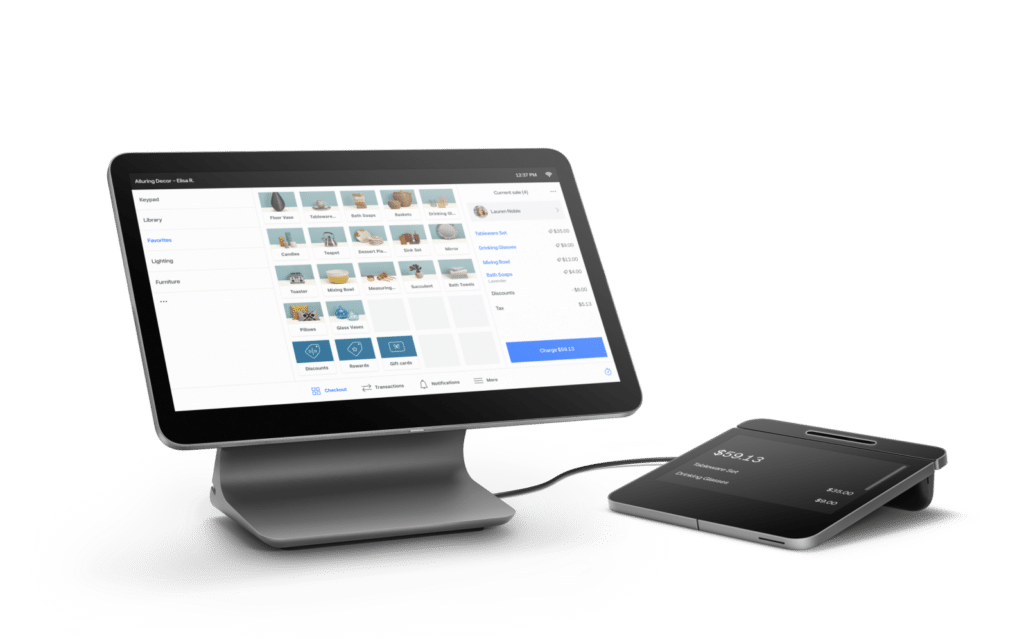
SQUARE POS overview
Square POS, created in 2009, offers an affordable Harbortouch POS alternative for businesses. It’s especially popular with startups and mobile food and beverage businesses due to its user-friendly interface and ease of use.
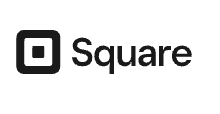
Pros
- Budget-friendly
- On-the-go POS options
- Comprehensive integration features
Cons
- Not ideal for full-service restaurants
- Poor customer support
- Insufficient reporting metrics
Pricing
Square for Restaurants Free
$0+/mo + fees
- Sell in person, online, over the phone, or out in the field
- Automatic customer directory
- Digital invoicing features
Square for Restaurants Plus
$60+/mo + fees
- Multiple location functionality
- Coursing features
- 24/7 customer support
Square for Restaurants Premium
$165+/mo + fees
- For businesses with more than five locations
- Additional software and hardware at no additional cost
- Custom plans for unique business needs
Square Key Features
- Ease of use: Square is known for its intuitive and user-friendly interface. Users can set up the system, adding products, and processing transactions with minimal training, and from anywhere. This ease of use can save mobile food businesses time and reduce the learning curve for employees.
- Hardware options: Square POS offers a range of compatible hardware options, from basic mobile card readers to more advanced countertop terminals. Businesses can choose the hardware that best suits their needs, whether for a brick-and-mortar store, pop-up, or food truck.
- Inventory management: Square POS offers inventory management tools that allow businesses to track stock levels, set up low-stock alerts, and easily add new products.
- Multi-location support: Users can manage inventory, sales, and employee permissions across different sites from a centralized dashboard.
- eCommerce integration: Square integrates with the Square Online Store, enabling food businesses to sell products online.
Square Pricing
Square POS for Restaurant
Base Plan ($0 per month, plus processing fees):
- Ideal for basic needs
- No monthly fees
- Includes basic features like:
- Point of sale app
- Inventory management
- Sales reporting
Plus Plan ($60+ per month, plus processing fees):
- Ideal for growing food businesses that need more features.
- Includes everything in the Free Plan, plus:
- Live sales reporting for real-time insights
- Coursing features
- Team management for assigning roles and permissions
- Loyalty programs to reward repeat customers
- Integrations with third-party apps for deliveries, accounting, etc.
Premium Plan ($165+ per month, plus processing fees):
- Ideal for food business with higher budgets and at least five locations.
- Includes everything in the Plus Plan, plus:
- Lower processing rates
- Real-time shipping rates
- Premium customer support
- Waived in-house delivery fees
- Additional software and hardware included
Additional Pricing Considerations:
- Square also charges for optional hardware like:
- Point-of-sale stands
- Receipt printers
- Kitchen Display Systems (KDS)
Also, Square charges a premium for processing for all plans that starts at 2.6% plus $0.10 per transaction for typical card swipes or dips.
Square Reviews
Square is another highly rated, widely-used POS system. Users rave about Square’s simplicity and ease of use, its e-commerce features, and portability. Critics argue that Square has high transaction and processing fees, and that customer service for basic plans is lacking.
It was super easy to get started, and it works perfectly for my inconsistent schedule of in-person markets. I’m new to my small business, and this was such an easy tool to offer customers more buying options.
– Erin S.
3. Toast POS: Best Harbortouch Alternative for Full-Service Restaurants
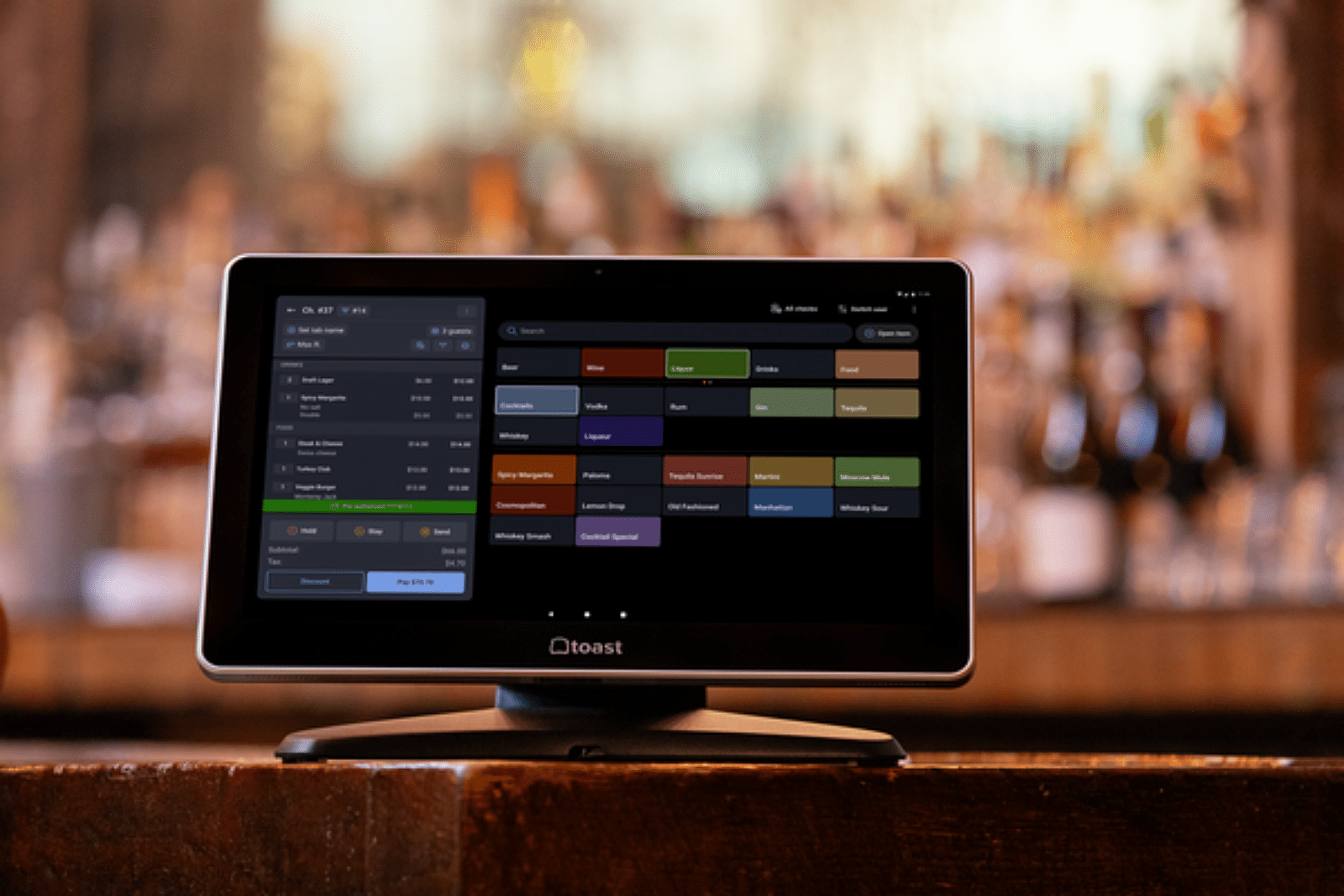
Toast POS overview
Toast POS was made for restaurants. It offers comprehensive features like table and order management, mobile POS capabilities for tableside ordering, and kitchen display systems (KDS) integration.
Harbortouch users will love Toast’s inventory management solutions, online ordering options, and restaurant-specific reporting tools.
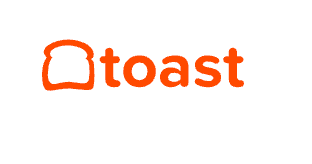
Pros
- Inventory management built-in
- Online ordering & payments
- Detailed reporting and analytics
Cons
- Mixed customer support reviews
- Contract required
Toast POS Pricing
Starter Kit:
$0/mo
- Reporting & analytics
- Menu management
- Toast invoicing
Core
$69/mo
- Toast mobile order and pay
- Toast delivery services
- Scheduling, powered by Sling
Build Your Own
Custom Pricing
- Payroll & team management
- Toast pay card and payOut
Toast Key Features
- Built-In Inventory Management: Toast simplifies restaurant inventory tracking. You can manage food costs, set par levels, and receive low-stock alerts to optimize inventory control and minimize waste.
- Integrated Online Ordering & Payments: Toast offers online ordering and payment processing. Customers can order takeout or delivery directly from your website, increasing sales opportunities and streamlining the ordering process.
- Detailed Reporting and Analytics: Toast’s robust reporting tools allow you to analyze sales trends, identify your most popular dishes, and track staff performance to make data-driven decisions to improve your restaurant’s operations.
Toast Pricing
Toast POS’s pricing includes software costs, hardware costs, and payment processing fees.
Software Costs
- Starter Kit ($0/mo): It includes basic features like reports and menu management. This system is best for small restaurants that just need one or two terminals and basic reporting features. It requires you to use their payment processing.
- Core ($69/mo): The plan offers multiple add-ons not found with the Starter Kit, including team management tools and API access.
- Custom pricing: This solution is best for larger restaurant operations that seek to drive more revenue and optimize operations with the full Toast platform.
Hardware Costs
Toast’s hardware offerings encompass a diverse range of products, including but not limited to:
- Toast Flex
- Toast Go 2
- Toast Flex for Guest
- Toast Flex for Kitchen
- Toast Tap
- Toast Printer
- Toast Hub
On average, Toast users spend $627-$1,034 on hardware.
Payment Processing Fees
Toast requires you to use their payment processing service. Fees typically range from 2.49% to 3.69% per transaction, plus a flat fee per transaction.
Toast Reviews
Toast is a well-known POS system in the food and beverage space. It’s well-loved, although not as highly rated as KORONA POS or Square. Users love Toast’s user-friendly interface and reporting features, but dislike its inconsistent customer service and frequent equipment malfunctions.
We use Toast for all of our restaurant needs, including POS, Payroll, Marketing, and Invoices/Inventory. The way the system integrates everything is so nice, and we have so much information at our fingertips—crucial for running in a low-margin industry.
-Craig W.
4. TouchBistro: Best Harbortouch POS Alternative for All-in-One Restaurant Management
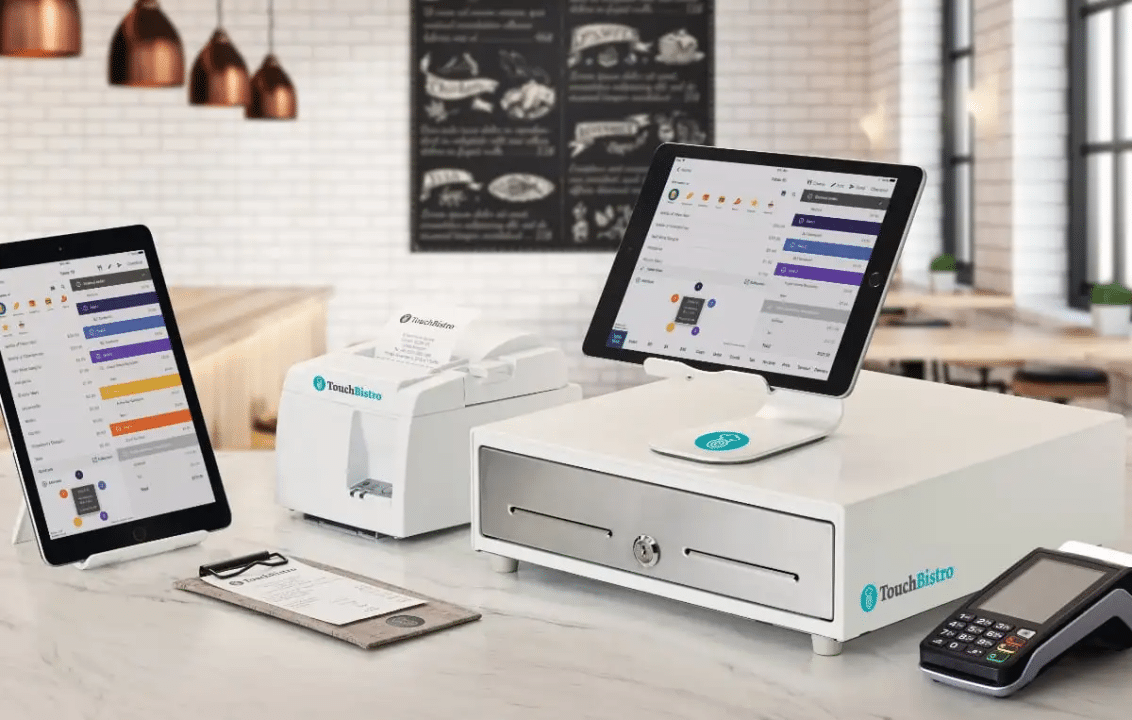
TouchBistro overview
TouchBistro is a point-of-sale (POS) system designed specifically for the food and beverage industry. It provides a comprehensive, all-in-one solution for restaurant management.
The software combines features like table and order management, inventory control, and customer relationship management (CRM) and supports various restaurant types, from full-service to quick-serve.

Pros
- Industry-specific design
- User-friendly interface
- Comprehensive reporting
Cons
- iOS only
- High monthly fees
- Limited integrations
Touchbistro Pricing
Front of House
$69/mo
- Staff Management
- Tableside Ordering
- Integrations
Back of House
From $19 to $330/mo
- Kitchen display system
- Profit management
Guest Engagement
From $25 to $229/mo
- Online Ordering
- Reservations
- Gift Cards
- Marketing
TouchBistro Key Features
- Floor plan and table management: TouchBistro’s POS system includes an intuitive table management module to help restaurants optimize seating capacity and provide better service. Features like table transfers enable smooth customer flow when parties switch tables mid-meal.
- Reporting & analytics: The cloud-based POS system offers real-time reports on over 50 KPIs that managers can access remotely anytime. TouchBistro’s user-friendly interface enables easy data sharing with the management team through automatic emails and integration with accounting software.
- Customer-facing display: The TouchBistro customer-facing display (CFD) allows guests to review their orders before sending them to the kitchen. The CFD also serves as an advertising screen highlighting special offers, new menu items, loyalty programs, and social media when not confirming orders.
- Tableside ordering system: TouchBistro’s offline mode allows quick-service restaurants to continue operating smoothly even when the internet goes down. Servers can still take customer orders, send them to the kitchen display system, and process payments. The offline mode syncs everything back up once connectivity is restored.
TouchBistro Pricing
Contracts
TouchBistro requires contracts and does not offer month-to-month subscriptions. Actual contract terms, lengths, and conditions are negotiated individually.
Hardware
The software is specific to iOS, so it runs on iPads. The company allows certain clients to use existing hardware.
TouchBistro starts at $69 per month for point-of-sale functionality. From there, the solution offers the following add-ons:
- Gift Cards: $25 per month
- Kitchen Display System: $19 per month
- Profit Management: $330 per month
- Back of House Inventory Management: $195 per month
- Back of House Labor Management: $69 per month
- Online Ordering: $50 per month
- Reservations: $229 per month
- Loyalty: $99 per month
- Marketing: $99 per month
TouchBistro Reviews
TouchBistro is a highly-rated POS system in the restaurant world. Users say the software is intuitive and easy to use, while critics argue that the system costs are high and server delays are common.
The room table layout and ticketing are easy to set up, and using the interface for order entry is a breeze—staff with no training can figure it out! We inherited the system when we purchased our business and, after researching alternatives, stayed with TouchBistro.
– Verified Food & Beverage User
5. Lavu: Best Harbortouch POS Alternative for Bars and Breweries
Lavu overview
Lavu POS is a point of sale system with features tailored specifically for bars and breweries.
With its user-friendly interface and robust functionality, Lavu POS enables establishments to manage orders, track sales, and maintain inventory, all while providing a seamless experience for staff and patrons.
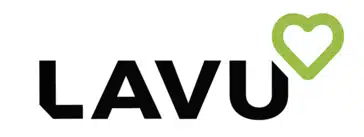
Pros
- Tailored for bars and breweries
- User-friendly interface
- Comprehensive inventory management
Cons
- Limited hardware compatibility
- Subscription costs
- Integration limitations
Lavu Pricing
Starter
$59/mo
- Loyalty
- Employee management
- Inventory Management
Growth
$149/mo
- Gift Cards
- Online Ordering
- DoorDash
Optimize
$279/mo
- Kitchen display system
- Accounts payable automation
- Quickbooks integration
Lavu Key Features
- Preauthorized Tabs: This feature allows bartenders to open and manage multiple tabs, reducing the risk of unpaid bills and streamlining the checkout process.
- Timed Menu Changes: Lavu enables automatic switching of menus for events like happy hours or special promotions, ensuring accurate pricing and availability.
- Inventory Management: Inventory management tools give Lavu users real-time access to inventory levels, with alerts for low stock, helping maintain optimal stock levels and reduce waste.
- Secure Payment Processing: Lavu offers Payment Card Industry (PCI)-compliant payment solutions, including tap-to-pay options, ensuring secure and quick transactions even during high-volume periods.
- Customer Loyalty Programs: The software features customizable loyalty programs to reward repeat customers.
- Detailed Reporting and Analytics: Users can generate comprehensive reports on sales, inventory, and employee performance, gaining valuable insights to inform business decisions.
Lavu Pricing
Lavu POS offers three subscription tiers with distinct features and costs. The pricing structure is influenced by whether customers choose the Lavu Pay Cash Discount Program. Here’s a breakdown of the plans:
Subscription Plans
Starter Plan
- Lavu Pay Cash Discount Program: $59/month
- Lavu Pay Traditional Processing: $69/month
- Includes inventory control, round-the-clock support, staff management, and customer loyalty programs
Growth Plan
- Lavu Pay Cash Discount Program: $129/month
- Lavu Pay Traditional Processing: $139/month
- Includes Starter Plan features plus MenuDrive Online Ordering, QR code ordering, and advanced management tools
Optimize Plan
- Lavu Pay Cash Discount Program: $279/month
- Lavu Pay Traditional Processing: $289/month
- Includes Growth Plan features along with accounting tools and comprehensive management options
Contract details
Lavu offers both 1-year and 3-year agreements. Longer contracts come with potential discounts. For example, a 3-year commitment might include interest-free financing on hardware. Customers can receive a 10% discount on the total cost by paying upfront.
Payment processing options
While Lavu Pay is an integrated payment solution, the system also supports external processors like Square, Heartland, and PayPal for an extra fee.
Lavu Reviews
Users of Lavu love the system’s ease of use—it’s especially useful for menu setup and selection. However, critics argue that the system glitches frequently and that customer service needs improvement.
The FOH interface is easy to use. However, every app has limitations —for example, the screen size. You have to deal with a small iPad screen, and I think Lavu does very well with that.
– Joseph R.
Choosing a Harbortouch POS Alternative: What to Look For
When choosing a Harbortouch POS alternative, it’s important to consider what you’re missing and what you need in a POS system. Below are some essential requirements to evaluate before making your decision:
Compatibility/Integration
Ensure the POS system integrates with your existing hardware and software, such as accounting systems, payment processors, and eCommerce platforms. KORONA POS is known for its comprehensive integrations.
Ease of Use
Choose a POS system with an intuitive user interface, especially if you or your staff aren’t tech-savvy. Look for one with minimal setup and training required to reduce onboarding time and prevent errors during transactions.
Customization Options
Different businesses have unique needs, so the ability to customize your POS system is key. Whether it’s tailored reports, personalized menus, or specific tax settings, you should be able to adapt the system to your operations without the expensive add-ons.
Security and Compliance
Data security and PCI compliance are non-negotiable in any POS system. Look for a platform that ensures customer payment information is protected and complies with industry regulations to safeguard against fraud and security breaches.
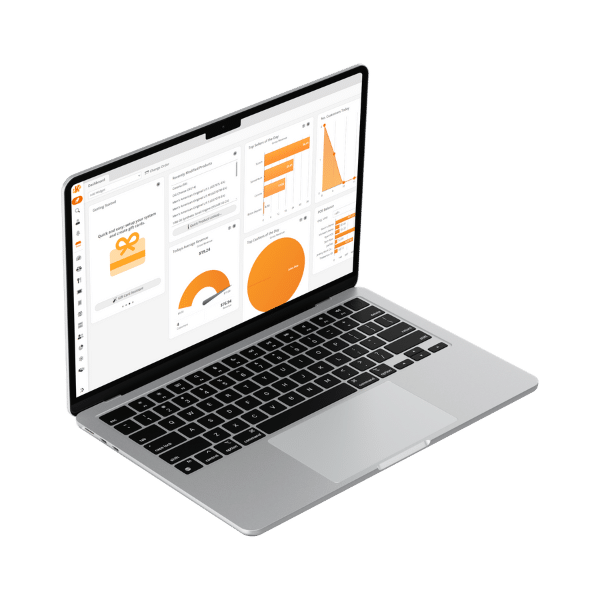
Speak with a product specialist and learn what KORONA POS can do for your business.
How to Switch Your POS System
Changing your POS system can feel like a hassle. With the proper planning, however, switching from Harbortouch POS can be a streamlined process. Here’s how to do it:
Step 1: Evaluate POS Alternatives
Research POS systems that align with your business needs and industry, whether you require inventory management, customer loyalty features, or specific integrations. Consider highly-rated providers like KORONA, Square, or Lavu, which each cater to different aspects of the restaurant and retail sectors. Read reviews, watch demos, and compare pricing to identify the best fit for your operation. Some providers, like KORONA POS, even offer free trials or consultations to help make the decision easier.
Step 2: Back Up and Export Data from HarborTouch
Before transitioning, backup critical data from your HarborTouch system, including customer information, sales history, and inventory levels. Many POS providers offer data export features, allowing you to save these records in a format that’s compatible with your new system. This ensures you don’t lose vital information during the transition and allows for continuity in customer service and operations.
Step 3: Configure and Set Up the New POS System
Once you’ve selected your new POS, follow the provider’s setup instructions, which may include installing new software or hardware. Customize the settings to match your business operations, including tax configurations, inventory lists, and employee accounts. Your new POS provider might offer onboarding assistance or setup support to help you get up and running smoothly.
Step 4: Train Your Staff and Transition to the New System
Schedule time for your team to learn the new POS interface and its features. Many providers offer tutorials, on-site training, or customer support to ease the learning curve. Begin by using the new system during slower hours to allow staff to practice without pressure. Once they’re comfortable, fully transition to the new POS, and follow up with regular training.
Do you have trouble getting your POS customer service on the phone?
KORONA POS offers 24/7 phone, chat, and email support. Call us now at 833.200.0213 to see for yourself.
Frequently Asked Questions
Below are a few of the common questions users ask about HarborTouch:
Which industry is HarborTouch POS designed for?
HarborTouch POS is designed primarily for the restaurant and hospitality industries, offering specialized features like table management, customer service tools, and inventory tracking.
Does HarborTouch charge processing fees?
Yes, HarborTouch charges processing fees for each transaction. Fees vary based on the type of card used and the specific terms of the merchant agreement, and they’re structured to cover transaction processing and related services.
What rates does HarborTouch charge for payment processing?
HarborTouch offers custom payment processing rates that depend on factors like transaction volume, business type, and card type. Typically, they use a flat-rate or interchange-plus model, so merchants are encouraged to contact HarborTouch directly to get tailored rate information.
Does HarborTouch have online ordering?
Yes, HarborTouch includes online ordering capabilities for restaurants and retail businesses. This feature integrates directly with the POS system, streamlining order management for both in-person and online sales.
The Best Harbortouch POS Alternatives: Wrap-Up
Choosing the right Harbortouch POS alternative depends on your specific business needs, budget, and operational goals. Always evaluate features like compatibility, ease of use, customization, and security, you can find a system that enhances your workflow and customer satisfaction.
With numerous competitive options like KORONA POS, it’s essential to weigh the features and support services of each to make the best decision for your business.


